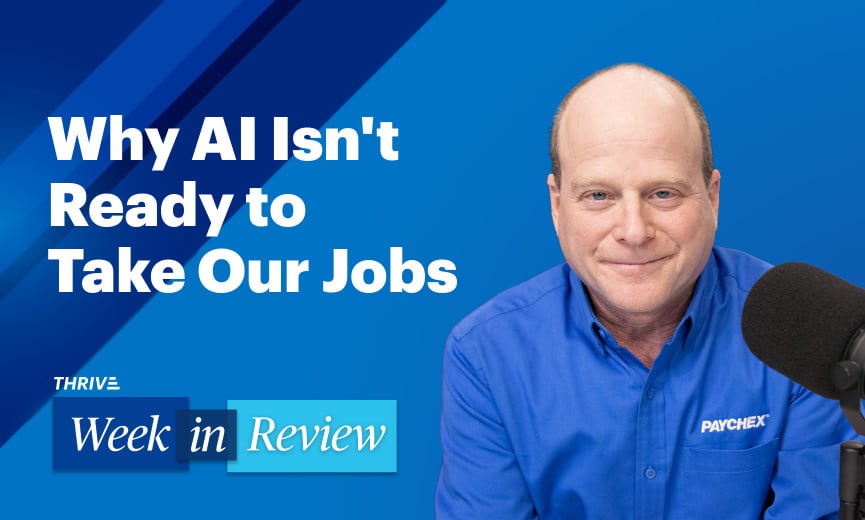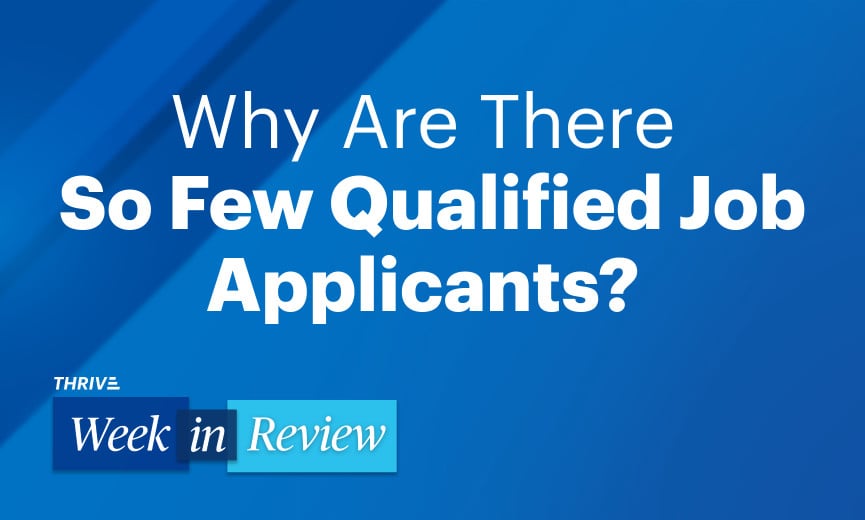- Thrive
-
Temporada
5Episodio55
Indicadores de inflación, préstamos de la SBA, seguridad laboral, impacto de las mascotas
Podcast •
Vea
Resumen
The indexes are all screaming deflation, while people on the street are screaming inflation, but host Gene Marks says there are signs that it isn’t as huge a threat as some think. In fact, Gene says this could result in interest rate cuts and better access to money. The SBA is making sure manufacturing is getting its accommodations with a new loan program that guarantees less red tape. Safety is seeing a major comeback as 78% of firms surveyed said the goal is to increase budgets for worker safety. Plus, one report showed the “home” safety net includes 67% of remote workers who would switch jobs so they wouldn’t have to leave their pets alone. What should employers do?
Make us an extension of your team: Meet Paychex
Ver transcripción
Hey everybody, it's Gene Marks, and welcome to this week's episode of the Paychex THRIVE Week in Review podcast. This is where we take a few items from the news that impact your small business, and we talk about them a little bit
But, you know, before we get started, this episode of Week in Review is brought to you by Paychex, a leading provider of payroll, HR, benefits and insurance services. And, you know, like me, I bet you're probably finding yourself, you know, stressed for time. I mean, this time of year, actually, as we just come off the summer, I don't know, it just kind of feels like everybody's getting back to work and all of sudden I'm getting all sorts of demands and requests and things to do, particularly with my larger clients, as well.
So, you know, as a business owner, it has a big impact on my productivity and it's a little bit stressful.
Well, Paychex can help by handling payroll, HR and more so you and I don't have to. I'm a Paychex customer, so I know this. You can get to know them better today if you visit paychex.com/meet-paychex. That's P-A-Y-C-H-E-X dot-com forward slash M-E-E-T-P-A-Y-C-H-E-X. You can also find the link in our show notes. So, check it out today.
And now let's get to the news that's impacting your business and mine this past week.
I'm gonna start with the Producer Price Index or the PPI. You know, the PPI declined; It was just announced this past week. For the third time this year, the Producer Price Index – this, according to CNBC – showed outright deflation, and what is generally considered a measure of pipeline price pressures.
Wall Street economists had been looking for a 0.3% increase. However, the core PPI, which strips out food and energy, fell 0.1%, and core minus trade services actually rose, though, 0.3%. But overall, PPI has been declining.
Fed officials not only look at the PPI as a driver for interest rates. So, could this mean that it's another incentive for the Fed to reduce interest rates? We know that consumer prices rose on an average basis of about 2.9%. But remember, the Purchasing Price Index, which is what I look at as a leading indicator of inflation, it's fallen. And it's the third time this year already that it's fallen, which means that prices in the future, because this is the cost to make the goods that eventually comes to consumers sometime in the future, has actually fallen, which basically tells me that inflation is still not as huge a threat as a lot of people may think.
So, just bear in mind, the Producer Price Index has fallen the third time this year. That may or may not be a good sign about inflation and also lower interest rates sometime later this year.
The next bit of news comes from the Small Business Administration. They have launched a new program for small manufacturers. If you're a manufacturer, you want to hear about this. This has been reported in bizjournals.com. It's under the Section 7(a) Manufacturers Access to Revolving Credit Loan Program. It'll offer working capital for small businesses engaged in manufacturing that the agency said in an announcement would provide maximum flexibility and minimum red tape.
Let me tell you a few things that you need to know about this program. The ability of this loan can be structured as either a revolving line of credit or a term loan. Term loans have a maximum maturity of 10 years, while revolving loans have a maximum maturity of, get this, 20 years. After 10 years, a revolving loan automatically converts to a fully amortizing loan with maximum additional repayment terms of up to 10 years.
The ability to be used, the funds can be used for any short-term working capital need of the manufacturer, supporting everything from inventory purchases to new projects. The new loan program cannot be used for non-working capital, debt refinancing, and a few other areas.
Why is this important to you as a manufacturer? This is special accommodations that are being made for manufacturers. The Small Business Administration will guarantee about 85% of this loan, and they are cutting red tape to make the banks get these loans out earlier.
If you go to a certified SBA bank and SBA lender, you will go through the same due diligence process, but again, their risk is lower. And now the SBA is really pushing for the certified banks to get money out to small manufacturers. These banks are mandated to do that.
So, it sounds like a big opportunity – a great opportunity – for small manufacturers to get some affordable financing. quickly and with less red tape. So, check out sba.gov, look for certified lenders, and consider using them if you are a small manufacturer.
Speaking of manufacturing, and whereas the new report came out from the accounting firm EY about safety. They found that most firms that they surveyed aimed to boost their budgets for worker safety in the next three years.
Here's a few things of interest. Nearly four out of five companies and government agencies worldwide – it's about 78% – plan to step up budgeting for environmental health and safety initiatives in the next three years, responding to rising workplace injury and mortality rates, according to the survey.
Through this spending, organizations plan to upgrade their efficiency, bolster their reputations, and improve resilience and business performance.
According to one representative for EY, they said, “Investing in safety not only helps you comply with regulations but also enhances your ability to operate effectively and responsibly.”
So, there have been lot of decreases in regulation since the Trump administration has taken over, but as I'm talking to the different associations that I go to – and I've been writing about this, as well, now – they've been leaving safety alone. OSHA is still in full force. Fines have actually increased a lot over the past few years due to inflation, and the definition of workplace violations have actually expanded, as well.
So, a little bit of advice about this. You need to be focusing on workplace safety. It's clearly a big issue among many firms around the country. OSHA offers a free consultation program (for) free. They will come out and visit your company and offer recommendations and suggestions if you are not in compliance with certain safety rules. It's geared towards small businesses.
In addition, talk to your insurance company. Insurance companies also offer free services, many do, to send out their representatives to check out your place of business and point out any potential safety concerns. I mean, they got skin in the game in this, as well.
Plus, I have a variety of clients that hire outside safety experts that do consulting. They make their recommendations and then they help implement their safety recommendations. I'm telling you guys, you want to make sure that you're paying attention to safety in your business. It's not just a compliance issue. It's a cost issue. It's a public relations issue. You might have a disgruntled employee like I just had at a client who leaves your business and then reports OSHA violations directly to OSHA without you knowing it.
So, it's really important that you stay up on safety. And again, according to this EY survey, a vast majority, almost 78 percent of companies worldwide, are really doubling down on their safety efforts.
Finally, there is pets. So, first of all, let's talk about pets, okay? Seventy-one percent of U.S. households now own a pet in 2025. That's up from 94 million homes and up from 65% just 10 years ago. Pet owners are no longer a niche group of employees and pets are not a perk to accommodate. They’ve become the majority voice in today's workforce and the data shows they're fundamentally changed how we wish to work.
Well, a new survey came out from a veterinarian platform called Total Vet, which finds that 67% of pet owners – two-thirds – would change their jobs rather than give up remote work, so that they can be with their pets. Seventy-one percent, I mentioned, have pets, and this basically means that they don't want to return to the office. Two-thirds of them would prefer not to return to the office, particularly if they have a pet.
Now, we as employers might be like, you got to be kidding me here. We need you back in the office. I don't really care if you have a dog or a cat. But, come on, we can't deny the fact that pet ownership has skyrocketed in just the past 10 years. A lot of people find it very, very important, and even because COVID is five years behind us, a lot of people got pets during that period of time, become very attached to them, and really are willing to take other jobs than yours if it gives them the opportunity to remote work so they can stay home with their pets.
Now, does that mean you have a pet policy in your office? You people can bring their dogs into the office. I know some companies that try to do this and it's not really a great policy, in my opinion, although some have been made it to work. Amazon has a bring your dogs to work policy, which you have to go through a lot of scrutiny to allow your dog to come into the office.
I don't know you want to go that far, but you do want to take into consideration that if you have a good, valuable employee or trying to attract a good employee, and they have a pet or pets at home and it's really important for them to work remotely because of their pets, as the study has shown, it might be a consideration when you're in the hiring process.
My name is Gene Marks, and you have been watching the Paychex THRIVE Weekend Review Podcast. If you need any help or advice or tips in running your business, sign up for our Paychex THRIVE newsletter. to paychex.com/thrive. Hopefully you have gotten some good information from this podcast. News that impacts your business.
I'll be back with you next week with more news that impacts your business. Look forward to talking with you then. Take care.
Do you have a topic or a guest that you would like to hear on THRIVE? Please let us know. Visit payx.me/thrivetopics and send us your ideas or matters of interest. Also, if your business is looking to simplify your HR payroll benefits or insurance services, see how Paychex can help. Visit the resource hub at paychex.com/worx. That's W-O-R-X. Paychex can help manage those complexities while you focus on all the ways you want your business to thrive.
I'm your host, Gene Marks, and thanks for joining us.
This podcast is property of Paychex, Incorporated 2025. All rights reserved.
Recursos adicionales
Check out how Paychex helps businesses

 Apple Podcast
Apple Podcast Spotify
Spotify iHeartRadio
iHeartRadio









